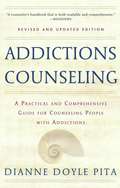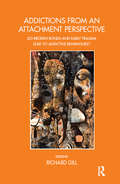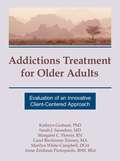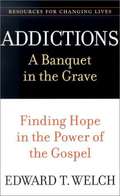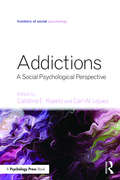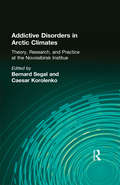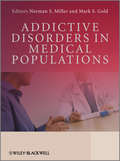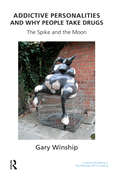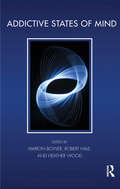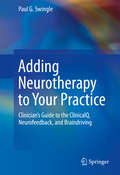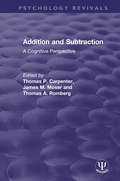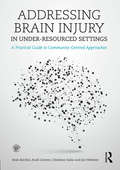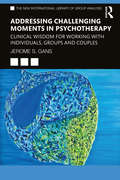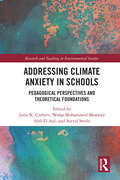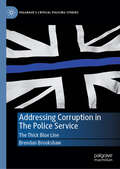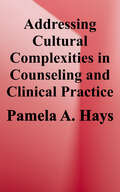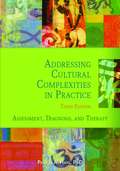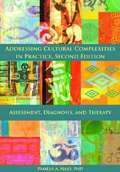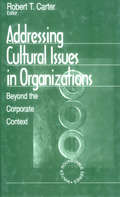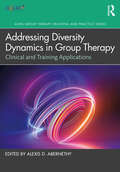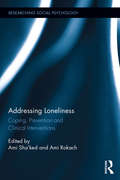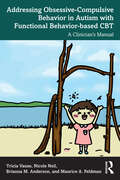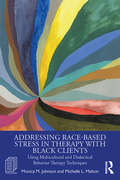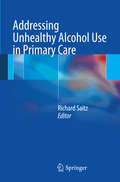- Table View
- List View
Addictions Counseling: A Practical and Comprehensive Guide for Counseling People with Addictions
by Dianne Doyle PitaThis wholly revised and updated edition of Addictions Counseling is widely read by professional counselors as well as ministers, teachers, and nurses. Topics include the counselor's role in recovery, treatment approaches, and sample treatment plans.
Addictions From an Attachment Perspective: Do Broken Bonds and Early Trauma Lead to Addictive Behaviours? (The Bowlby Centre Monograph Series)
by Richard GillThis outstanding book is an important collection of papers from the 2013 John Bowlby Memorial Conference by accomplished clinicians from different modalities who share their experience of working with people with different kinds of addiction. The papers bring together an in-depth understanding that addictions are a response to, and hold the pain of, broken attachments and are best treated within healthy interpersonal relationships. For a long time the person with an addiction has been seen as the problem with society being able to live in denial of the causes. These papers open up innovative and effective ways of working with people troubled by addiction from an attachment-informed perspective. Contributors: Cara Crossan, Richard Gill, Lynn Greenwood, Bob Johnson, Liz Karter, Edward Khantzian, Arlene Vetere, Kate White, Jason Wright
Addictions Treatment for Older Adults: Evaluation of an Innovative Client-Centered Approach
by Kathryn Graham Sarah J Saunders Margaret C Flower Carol B Timney Marilyn White-Campbell Anne ZeidmanHere is a detailed description of an innovative approach for treating elderly persons who have alcohol or drug problems. During the past few years there has been growing recognition of the special needs of these individuals. Addictions Treatment for Older Adults describes the evaluation of the Community Older Persons Alcohol (COPA) Program. This book helps readers understand the nature of substance abuse among the elderly, as well as how to identify and intervene with older persons who have alcohol and drug problems, including persons who are reluctant to seek treatment. Addictions Treatment for Older Adults explains the development of the COPA program and how it works. Many case studies and tables provide illuminating details for readers who work with this elderly population. Chapters examine characteristics of elderly persons with alcohol or drug problems the typology of COPA clients and their problem areas treatment interventions variables associated with improvement analysis of progress made by clients during and after treatment the factors that seem to predict recoveryThe in-depth descriptions in this book provide much needed information and guidance for professionals striving to meet the treatment and care needs of elderly substance abusers. Addictions Treatment for Older Adults should be read by researchers in the substance abuse field and by persons who work with the elderly, such as community nurses, social workers, and physicians. In this book they will find the best description to date of the nature of alcohol and drug problems among elderly who live in their communities.
Addictions: A Banquet in the Grave, Finding Hope in the Power of the Gospel
by Edward T. WelchThis book on addictions offers a profoundly biblical analysis of addictive behavior and helps readers face their own addictions.
Addictions: A Social Psychological Perspective (Frontiers of Social Psychology)
by Catalina E. Kopetz Carl W. LejuezThe current volume brings together social psychological theories and concepts and discusses their relevance to understanding substance use and addiction. It identifies convergence points between traditional perspectives on addiction and social psychological theory and research. This coexistence, which acknowledges the value of the conceptual and methodological advancements in each relevant field and attempts to integrate them, promotes scientific understanding and a more effective prevention and treatment of addiction.
Addictive Disorders in Arctic Climates: Theory, Research, and Practice at the Novosibirsk Institute
by Bernard SegalDiscover fresh perspectives on alcoholism treatment and research with this enlightening new book describing the work of researchers at the Novosibirsk Medical Institute, USSR. By using specific examples of their studies in Siberia, the reserachers offer an innovative approach to the treatment of addictive disorders in general. Instead of focusing on the drinking behavior itself, the treatment focuses on the relation of the problem to the interaction of economic, social, and psychological factors. To address the question of whether alcoholics should all be treated in the same way, or if alcholism treatment should be more individualized in approach, chapters are devoted to the differences between alcoholism in women, adolescents, and alchoholics who are afflicted with “rapid development of alcholism syndrome.” The research examples in Addictive Disorders in Arctic Climates benefits professionals involved in the treatment of alcholism by introducing new perspectives and broadening contemporary research.
Addictive Disorders in Medical Populations
by Mark S. Gold Norman S. MillerThis book has a much wider focus than traditional books written about drug and alcohol addictions. This unique book is written by medical specialists who diagnose, treat and research addictive disorders in their specialities. Thus, it meets the needs of the typical medical practitioner who wants to learn about and treat patients with addictive disorders in their practices. Because alcohol and drug problems are so prevalent and affect medical conditions profoundly, the medical specialist will improve their knowledge and skill to diagnose and treat addictive disorders in their specialties.Drug and alcohol addictions occur commonly in medical populations; 25-50% of patients seen by primary care physicians have alcohol and drug disorders, with even higher prevalence in certain medical specialty populations. Drug use (including illicit drug use and actual or perceived misuse of prescribed medications), alcohol use, and what has been called unhealthy drinking are even more common in trauma centers and our society. Currently, there are no authoritative addiction texts that focus on the identification, intervention and management of either "addictive disorders in medical populations" or "medical complications in addiction populations".Neurobiological progress in the field of addiction has been amazing and evidence-based treatments have developed at a phenomenal pace, with bench to office applications for tobacco, alcohol and drugs. Pharmacological and psychosocial treatments are described here in detail and in practical terms. The medical and mental complications of addiction are explained comprehensively throughout the text. Clinical considerations are the predominant theme, with the standards of clinical practice grounded in the most current research. The chapters include practical presentations of both clinical and research materials, with instruments for screening and assessment and treatment.It will be useful for all those seeking information to help a patient or family with a tobacco, alcohol or drug problem. We hope this book can give answers and direction to the identification and management of addictions and their medical complications in patient populations.
Addictive Personalities and Why People Take Drugs: The Spike and the Moon (The\united Kingdom Council For Psychotherapy Ser.)
by Gary Winship'Why do we take drugs? I haven't the faintest idea, but Gary Winship has a damned good go at telling me the answer. Some might say this is a largely academic book, but as an ex-psychiatric nurse and a Jo Public for the last twenty-five years, I'd say there's something in here for everyone. We've all taken drugs at some point in our lives (except, perhaps, my grandma) so one way to find out why is by reading this fascinating book.'- Jo Brand, comic, author, and actress
Addictive States of Mind (Tavistock Clinic Series)
by Rob Hale Heather Wood Marion BowerThis chapter, written by a psychiatrist working with people with severe and complex addictions, sets the scene. We are provided with a graphic account of the multiple problems—physical, psychological, social, financial—of someone with severe drug addiction, where sex working and the risks of pregnancy, infection, and assault compound an already challenging presentation. The personal history of trauma and abuse means that the patient requires highly skilled and sensitive management, and adaptations in service provision—such as no morning appointments—that respect the individual’s lifestyle. The conflict for professionals is encapsulated in a brief description of the responses of Vanessa Crawford’s patient group when asked what messages they would like to be conveyed to future doctors: don’t prejudge us, treat us as individuals, give us proper pain control—and “don’t trust us”. Implicit in this is the recognition that they are in the grip of something that leads them to deceive, probably themselves, but also others—a wish to pervert a relationship to someone who is trying to help. Crawford conveys the importance of being knowledgeable, but not omniscient; of helping the individual to overcome the barrier of shame, which may lead to information being withheld; and the crucial contribution of a collaborative and coherent staff team in containing such challenging patients and in helping them to turn a corner towards recovery.
Adding Neurotherapy to Your Practice: Clinician’s Guide to the ClinicalQ, Neurofeedback, and Braindriving
by Paul G. SwingleThis clinical manual argues for using neurotherapy to enhance mental health and medical practice across settings and specialties. The text takes readers through the tools and methods of neurotherapy: the ClinicalQ for intake assessment, a stimulated EEG modality called braindriving, and neurofeedback protocols to retrain brain function. Case studies demonstrate neurotherapy as an efficient component in treating brain-related and mind/body conditions and symptoms, from ADHD, sleep disturbances, and depression to fibromyalgia and seizures. Its methods allow clinicians to find deviations in brain function that fall through the diagnostic cracks and choose therapeutic interventions best suited to clients based on reliable data. Included in the coverage: Treating the condition instead of the diagnosis. Case examples illustrating how to conduct the ClinicalQ, interpret results, and convey them to clients. Sample protocols of braindriving and neurofeedback. Using therapeutic harmonics to advance neurotherapy. Age-appropriate neurotherapy for children and seniors. Brainwave diagrams, data tables, client forms, and other helpful tools and visuals. Adding Neurotherapy to Your Practice will interest psychologists, physicians, psychiatrists, chiropractors, and social workers. This stimulating presentation emphasizes the individuality of every client, and the abundant healing capacity of the brain.
Addition and Subtraction: A Cognitive Perspective (Psychology Revivals)
by Thomas P. Carpenter; James M. Moser; Thomas A. RombergA hallmark of much of the research on children’s thinking in the 1970s had been the focus on explicit content domains. Much of this research had been represented by an eclectic collection of studies sampled from a variety of disciplines and content areas. However, in the few years before this publication, research in several content domains has begun to coalesce into a coherent body of knowledge. Originally published in 1982, the chapters in this work represent one of the first attempts to bring together the perspectives of a variety of different researchers investigating a specific, well defined content domain. This book presents theoretical views and research findings of a group of international scholars who are investigating the early acquisition of addition and subtraction skills by young children. Together, the contributors bring a blend of psychology, educational psychology, and mathematics education to this topic. Fields of interest such as information processing, artificial intelligence, early childhood, and classroom teaching and learning are included in this blend.
Addressing Brain Injury in Under-Resourced Settings: A Practical Guide to Community-Centred Approaches
by Rudi Coetzer Ross Balchin Christian Salas Janice WebsterMany of the world’s population have no access to appropriate diagnostic, neurorehabilitative or support services following brain injury. Addressing Brain Injury in Under-Resourced Settings: A Practical Guide to Community-Centred Approaches tackles this unacceptable gap in service provision by empowering the reader to provide basic care, education and support for patients with brain injuries and their families. Written for an audience which does not necessarily have any prior knowledge of the brain, neurorehabilitation or brain injuries/pathologies, this practical guide first examines the global context of brain injury, considering the cross-cultural realities across communities worldwide. The book goes on to explore the reality of brain injury and how to work with its consequences, offering practical knowledge and advice in a user-friendly, richly illustrated format. It provides easily digestible information about the brain, including its normal functioning and the ways in which it can be damaged through injury and disease. The book also covers the basic skills needed to identify neurological difficulties and provides guidance on basic rehabilitation input and support. The final section of the book covers how to provide services, including working with organisations and communities, volunteering, initiating and developing community-based projects and programmes, and caring for patients and their families from emergency to recovery to rehabilitation. This book is an invaluable resource for community health workers, voluntary sector workers and all professional healthcare providers who work with brain-injured patients around the world. It will also be important reading for policy developers, fundraising organisations and those who work with global humanitarian initiatives.
Addressing Challenging Moments in Psychotherapy: Clinical Wisdom for Working with Individuals, Groups and Couples (The New International Library of Group Analysis)
by Jerome S. GansThis practical and helpful volume details how clinicians can work through various common challenges in individual, couple, or group psychotherapy. Chapters draw upon clinical wisdom gleaned from the author’s 48 years as a practicing psychiatrist to address topics such as using countertransference for therapeutic purposes; resistance, especially when it needs to be the focus of the therapy; and a prioritization of exploration over explanation. Along with theory and clinical observations, Dr.Gans offers a series of "Clinical Pearls," pithy comments that highlight different interventions to a wide range of clinical challenges. These include patient hostility, the abrupt and unilateral termination of therapy, the therapist’s loss of compassionate neutrality when treating a couple, and many more. Many of the "Clinical Pearls" prioritize working in the here-and-now. In addition to offering advice and strategies for therapists, the book also addresses concerns like the matter of fees in private practice and the virtue of moral courage on the part of the therapist. Written with clarity, heart, and an abundance of clinical wisdom, Addressing Challenging Moments in Psychotherapy is essential reading for all clinicians, teachers, and supervisors of psychotherapy.
Addressing Climate Anxiety in Schools: Pedagogical Perspectives and Theoretical Foundations (Research and Teaching in Environmental Studies)
by Julie K. Corkett Astrid Steele Wafaa Mohammed Moawad Abd-El-AalThis monograph presents a contemporary examination of climate anxiety within schools. Featuring contributions from experts across Canada, Austria, Australia, New Zealand, the United Kingdom, Italy, and Finland, the book underscores the prevalence of climate anxiety, a phenomenon often overlooked in discussions about climate change and education. The monograph is divided into two sections. The first section begins by outlining how climate anxiety manifests in schools, examining the theoretical underpinnings of climate change education and its psychological impact on students and teachers. The second section presents innovative and practical strategies for mitigating climate anxiety in the classroom, highlighting the importance of cohesive learning environments and cross-curricular approaches. Readers will benefit from the book’s international perspective and its blend of theory and practice, gaining valuable insights into how to address climate anxiety and foster resilience in educational contexts.An international, empirical, and ethnographic evidence-based perspective of climate anxiety in classroom, this book will appeal to scholars, researchers, postgraduate students, and educators with interests in climate change education, sustainability education, policy and administration, mental health, and pedagogy.
Addressing Climate Change in Local Water Agency Plans: Demonstrating a Simplified Robust Decision Making Approach in the California Sierra Foothills
by David G. Groves Evan Bloom David R. Johnson David Yates Vishal MehtaThis report describes an approach for planning under deep uncertainty, Robust Decision Making (RDM), and demonstrates its use by the El Dorado Irrigation District (EID). Using RDM, the authors and EID tested the robustness of current long-term water management plans and more robust alternatives across more than 50 futures reflecting different assumptions about future climate, urban growth, and the availability of important new supplies.
Addressing Corruption in The Police Service: The Thick Blue Line (Palgrave's Critical Policing Studies)
by Brendan BrookshawThis book offers an autoethnographic examination of the author's last three years as a serving police officer and as Head of the Professional Standards Department, recorded in personal journals. It analyses the emotional and philosophical impact arising from day-to-day interactions with police officers and reflects on corruption and how it is perceived both inside and outside the service. This book posits a model of the kakistocratic police milieu as a theoretical framework for analysis of the police in contemporary neoliberal liquid modernity which could be used to explore other police phenomenological research data. This autoethnographic insider research provides a rare addition to the knowledge on police corruption. It speaks in particular to those doing professional policing degrees and police practitioners.
Addressing Cultural Complexities in Counseling and Clinical Practice: An Intersectional Approach
by Pamela A. HaysThe author's popular bestseller invites readers to move beyond a one-dimensional view of identity to a nuanced understanding of the overlapping cultural influences that affect us all. This fourth edition's new chapters feature culturally adapted cognitive behavioral tools and techniques, and trauma due to racism and other systemic forms of oppression. It remains richly illustrated with case material, with many new vignettes and examples demonstrating the ADDRESSING framework in both counseling and clinical practice. Other new material includes updated discussion of gender identity, with attention to clinically relevant research regarding transgender and nonbinary people, more on people with disabilities (the largest minority group in the U.S.), the latest terminology and language regarding diverse minority groups, and a special section on social justice and its relationship to therapeutic practice. In an increasingly diverse society, mental health providers must be able to work effectively with a wide variety of clients. The ADDRESSING framework shows clinicians and counselors how to take into account age and generational influences, developmental or other disability, religion and spirituality, ethnic and racial identity, Indigenous heritage, national origin, socioeconomic status, sexual orientation, and gender. Each chapter includes Key Ideas summaries and practice exercises, making this book ideal for personal, educational, or group use.
Addressing Cultural Complexities in Practice: Assessment, Diagnosis, and Therapy
by Pamela A. HaysIn an increasingly diverse society, psychotherapists must be able to work effectively with a wide variety of clients, each of whom has been shaped by a different mix of cultural and social influences. Pamela Hays' popular bestseller invites readers to move beyond a one-dimensional view of identity to a nuanced understanding of the factors that enable therapist and client to interact productively.
Addressing Cultural Complexities in Practice: Assessment, Diagnosis, and Therapy (Second Edition)
by Pamela A. HaysMeant for counsellors, clinicians, and mental health professionals, the author helps therapists recognise and understand the cultural influences which define and drive each of us.
Addressing Cultural Issues in Organizations: Beyond the Corporate Context
by Robert T. CarterAnalyzing how unexamined cultural patterns influence an organization's culture, this book provides conceptual models and ideas about how to build practical approaches to organizational interventions. The contributors focus on the broad issues such as how organizational leaders shape and influence the agenda surrounding culture; cover institutional and organizational issues in corporate, educational, mental health, and service organizations; and discuss various organizational intervention strategies and approaches.
Addressing Diversity Dynamics in Group Therapy: Clinical and Training Applications (AGPA Group Therapy Training and Practice Series)
by Alexis D. AbernethyThis book illustrates group dynamics and group interventions in response to diversity-related content and processes in group therapy.Perspectives informed by conceptual frameworks guide the discussion of specific clinical interventions and the implications for training. Cultural dimensions of race, international heritage, classism, religion, and aspects of intersectionality associated with these dimensions are a particular emphasis. Key sections for each chapter include Conceptual Framework, Group Interventions, Teaching or Case Examples, Intersectionality, Ethical Considerations, and Implications for Training and/or Practice. Professional development opportunities for mental health professionals as well as training implications for psychiatry residents and psychology interns is addressed, and case studies offer practical examples for guiding therapists and trainees to intervene more effectively in addressing diversity dynamics in group therapy.An important and timely resource that belongs in every group practitioner’s repertoire, this resource is broad enough to be integrated into a course for a training or graduate program and specific enough to serve as a shelf reference for those in practice.
Addressing Loneliness: Coping, Prevention and Clinical Interventions (Researching Social Psychology)
by Ami Sha'Ked Ami RokachThis is a volume on loneliness and what can be done to address its pain. While most books simply describe loneliness from one author’s point of view, this volume includes a comprehensive review of the literature and employs top researchers in the field discuss their own research findings, conclusions and clinical experience. It explores the relationship between loneliness and sexuality, loneliness and optimism, and parental loneliness during pregnancy and childbirth. It also addresses loneliness throughout the life cycle in children, adolescents, the elderly and disabled, leading to a variety of coping and therapeutic modalities aimed at helping those who suffer from loneliness in its various forms.
Addressing Obsessive-Compulsive Behavior in Autism with Functional Behavior-based CBT: A Clinician's Manual
by Tricia Vause Maurice A. Feldman Brianna M. Anderson Nicole NeilThe Clinician’s Manual and its accompanying workbook, I Believe in Me, Not OCB! are the first known manuals to combine cognitive behavioral therapy and applied behavior analysis to treat obsessive-compulsive behavior (OCB) in children and youth with autism. The Clinician’s Manual serves as a practical guide for therapists, beginning with chapters that explain the theoretical underpinnings of OCBs, adaptations for autism, and guidance on clinical and functional behavioral assessment that are key to administering the nine treatment sessions that follow. Our evidence-based treatment incorporates functional behavioral assessment, CBT skills training, caregiver coaching, and social skills activities in a nine-week progressive program. Caregiver and child report data inform progress throughout the program. Generalization and maintenance are promoted through weekly caregiver coaching modules. Treatment can be delivered in a group or individual format and focuses on reducing OCBs with the ultimate goal of increasing quality of life. The manual provides all clinician, child, and caregiver instructions as well as materials to implement functional behavior-based CBT with precision. These manuals are a vital resource for clinicians working with autistic children and youth and their families.
Addressing Race-Based Stress in Therapy with Black Clients: Using Multicultural and Dialectical Behavior Therapy Techniques
by Monica M. Johnson Michelle L. MeltonDespite Black Americans being at high risk for negative mental health symptoms due to racism and other chronic stresses, disparities persist in the provision of mental health services to this population. This book addresses that gap in clinical practice by explicitly calling attention to the experience of race-based stress in the Black community. Johnson and Melton urge mental health practitioners to action in promoting societal understanding, affirmation, and appreciation of multiculturalism against the damaging effects of individual, institutional, and societal racism, prejudice, and all forms of oppression based on stereotyping and discrimination. Chapters include worksheets, vignettes, and case studies to provide a practical framework for implementing an effective, nonpathological approach to ameliorating the damaging effects of race-based trauma and stress. This book will give tools and strategies for mental health professionals to responsibly use scientific and professional knowledge to improve the condition of individuals, communities, and, by extension, society.
Addressing Unhealthy Alcohol Use in Primary Care
by Richard SaitzWhile there is a wealth of published information on addiction medicine, the psychological aspects of alcohol abuse, and behavioral medicine with regard to addiction, virtually none of these resources were written with the primary care provider in mind. Addressing Unhealthy Alcohol Use in Primary Care is a resource for primary care clinicians who are confronted by patients with these problems daily, and who wish to successfully address these issues in their practice. It would focus on the literature and science relevant to primary care practice and cover the range of interventions appropriate for this setting. Topics include assessment, brief counseling interventions, pharmacotherapy, referrals to both specialty care and Alcoholics Anonymous (and other self-help programs), psychiatric co-morbidity and other drug use, and other information specific to the needs of the primary care provider.
